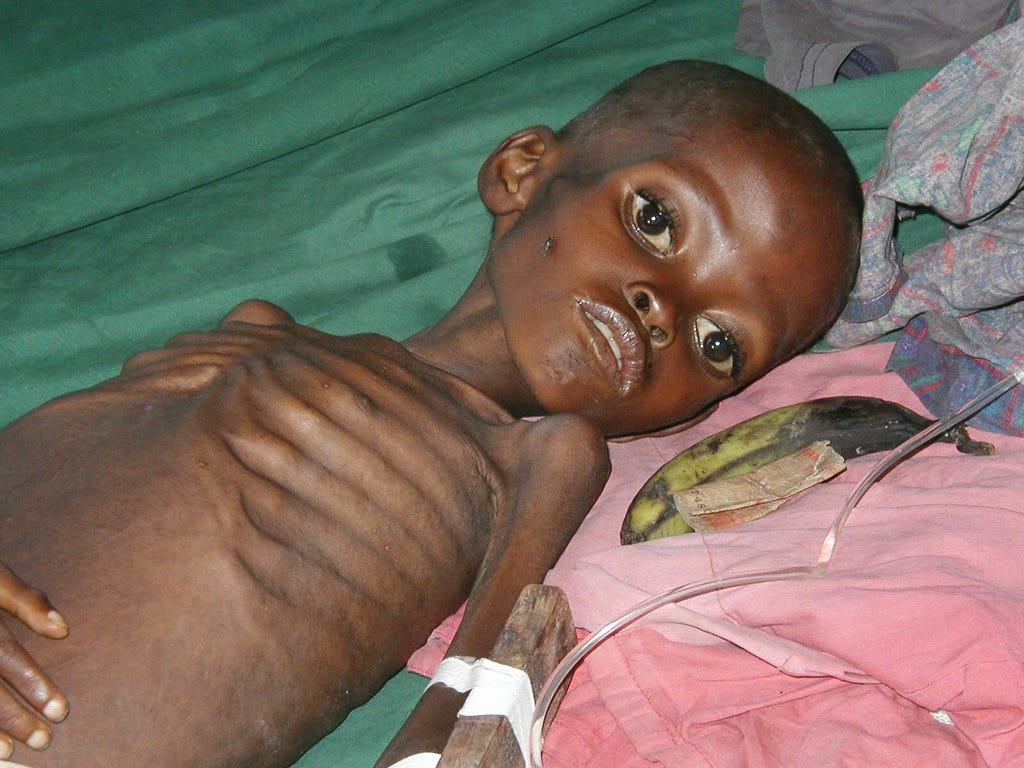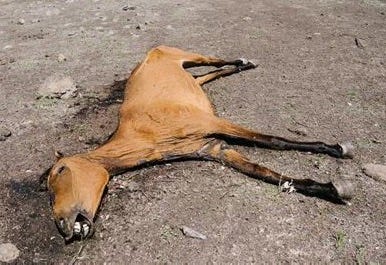I Saw a Dead Horse in the Road
It was a burning horse then. It’s a burning house now
In Palestine, people are dying because of a lack of access to food, with food supplies, though nearby, disrupted by war and anger. Seeing children with marasmus is unbearable.
It reminded me of a day in Mexico, one I will never forget.
A dead animal in the road is usually a squashed-out squirrel, raccoon, possum, woodchuck, skunk, snake, or domestic animal. But never a horse. Yes, I once saw a dead horse on the side of the road.
Thirty-five years ago, I was a visiting professor at the medical school in Guadalajara, Mexico. We were staying some distance from the school, so each morning my host drove me in. One morning, I noticed a dead horse alongside the road. The horse was not the twisted, bloody, flattened carcass of the typical roadkill. It was not hit by a vehicle. Rather, it was a thin, skeleton-like animal that died of malnutrition or a disease. Its legs were stiff and straight, its ribs prominent, its head contorted around a mangy grin of enormous teeth.
“Large animal carcasses can pose disease risks and attract scavengers like hungry people, so prompt removal is important,” said my host, a wizened, crafty professor. “We see it often.”
“Hungry people scavenging?”
“Yes, I’m afraid so.”
The scene was indelible. I fiddled with my book, looked at the passing hills and desert, and thought, “I’m lucky I never have to deal with this.” No, not the horse. Starvation.
On our return trip, the horse had been incinerated, leaving a dune of charred ashes. “What happened?” I asked my host physician. He took his pipe from his mouth, brushed the ashes from his coat, and turned to me with a desolate look.
“The authorities came to burn the horse before the locals eat it. Most likely, it died of a potentially communicable disease.”
The cinders and residue reminded me of the aftermath of the 4th of July bonfire we lit in the middle of the road when I was a kid. What we left wasn’t just a pile of ashes. It was the stain, the dark, alarming, immutable stain remaining on that road. I noticed it daily for the remainder of the summer.
We flitted by the carcass, and I conjured the smell of irritating acrid smoke and burned flesh.
“It happens all the time. Horses die. People are hungry.”
I was gobsmacked. Here I was lecturing at a university where I was a well-fed guest, and along the way, I was confronted by the blunt reality of starvation, where the locals were willing to take the chance on a diseased, dead animal for survival.
“There is not much we can do,” the professor said. “There is neither work nor resources. These people are poor and starving, and we cannot help them.” He blunted the ashes of his pipe with his thumb and slumped lower in the seat. “That is why, my friend, people are leaving our country. They’re dying.” It froze me that day forty years ago. And it brought me to today.
Today’s news is shocking. The brutal images are dreadful. The impact of war on food security is devastating, affecting the most vulnerable, especially children and the elderly, and not those who make the decisions.
It shook me then, and it was a horse. It shakes me now because it’s people, kids. Unacceptable. Starving children when something can be done about it? No access to food that was so close?
More than 500,000 people in the Gaza Strip are facing Phase Five conditions, characterized as catastrophic levels of food insecurity. About 1,000,000 people, 54% of the population, are facing Phase Four conditions, characterized as emergency levels of food insecurity.
Between mid-August and the end of September, almost a third of the population -- nearly 641,000 people --- are expected to face Phase Five catastrophic conditions, and the number is expected to increase.
Forty years ago, we sped by that horse and a startling explanation. Today, I pause. I didn’t change the channel. I had an instinctive need to help.
Depending on resources, skills, and preferences, you can: donate, volunteer, advocate, and educate. Ask a food bank, religious organization, or soup kitchen, or look for volunteer opportunities, advocacy groups, programs, and leaders. Check credible websites.
The idea of someone eating a dead, diseased horse was striking. The thought of innocent people starving because their so-called leaders cannot figure out how to live peacefully is appalling.
It can change your perspective on gratefulness and social responsibility.
Our Judeo-Christian values have been based upon faith and service to take care of the poor, the immigrant, and the stranger. We must stand by those principles of human dignity, justice, compassion, and moral absolutism.
Something needs to change. I know it needs to change. We all know it needs to change. How? When?
This is the last stanza from Michael R. Burch’s poem, Neglect
How pitiful our “effort,”
yet how fatal its effect.
If they died, then surely we killed them,
if only with neglect.
It was a burning horse then. It’s a burning house now.
Copyright 2025




This article stunned my senses. The description of the dead horse is repugnant but strikingly evocative. The analogy to starvation in Gaza is even
more jarring. What happened to our Judeo-Christian values?
Our Judeo-Christian values have been based upon faith and service to take care of the poor, the immigrant, and the stranger. Yes, we must stand by those principles of human dignity, justice, compassion, and moral absolutism. Or, passively witness the genocide in Gaza?
Thanks for your outstanding article Our world is upside down How can we re right it with so much political fervor?